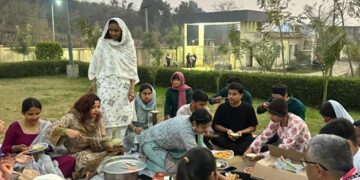By: Afreen Manzoor
“If you want something said, ask a man; if you want something done, ask a woman.” — Margaret Thatcher
What if we stopped settling for symbolic inclusion and began demanding full empowerment—where women are not just present, but powerful? In an age that applauds minimal progress, the urgent task of our time is to pursue women’s empowerment in its fullest, most uncompromising form. Irony is that women are happy as long as their individual self is secure, yet we forget it’s not woman vs woman anymore, but woman for woman.
Across various spiritual traditions, the dignity and autonomy of women are emphasized yet culture silenced it under the guise of patriarchy. In Islam, the Holy Qur’an states that the origin of man and woman is the same (Al-Qur’an 4:1). Hindu philosophy, similarly, recognizes the inherent equality of men and women through the concept of Ardhanarishvara, where Shiva (male) and Shakti (female) merge to represent the cosmic balance of masculine and feminine energies. Christian teachings also assert that both genders should have equal opportunities to pursue their talents and aspirations, including the right to work if they choose to.
Yet, in stark contrast to these affirmations, global data tells another story. According to Statistics.com, although women make up nearly half the world’s population, the global gender ratio stands at 101.07 males per 100 females. When religion gave free hand to women to pursue their goals, the culture and male ego evaded workspaces preventing women from entering them as revealed by Gender Gap Report 2025 reveals that only 61% of prime working-age women participate in the labor force, compared to 91% of men.
In Women’s Empowerment in India: Rational and Present State (2017), Dhyana Dipta Panda argues that despite formal improvements like rising female literacy and legal protections, women in India remain structurally disempowered. A key reason is that empowerment initiatives often operate in silos, addressing symptoms but not causes. For instance, while welfare schemes may provide financial support, they rarely challenge the deeply embedded patriarchal norms that define women’s roles as secondary and this is where we have to start our movement for full empowerment.
Panda points to political exclusion as both a cause and consequence of this failure
For example, the passage of the Women’s Reservation Bill, 2023 by both the Lok Sabha and Rajya Sabha, and its subsequent assent by President Droupadi Murmu on September 28, 2023, marked a historic milestone. Yet, the bill remains unimplemented, reflecting the deep-rooted stereotypes and patriarchal norms that prevent women, and their voices to echo in chambers of Parliament.
Statistics are shocking globally as well. According to recent surveys, only 87 countries have ever had a female head of state. Women hold only 26% of parliamentary seats worldwide. These numbers are not just statistics, they are a mirror reflecting systemic exclusion. This highlights the persistent barriers that women face in achieving equal representation in politics and decision-making spaces, even when supportive laws exist on paper.
Five Concrete Solutions to Advance True Women’s Empowerment
- Reclaim Religious Teachings from Cultural Patriarchy:
Culture has done more harm to women than anything, worst is, it all derives legitimacy from religion. Launch interfaith campaigns led by women scholars and reform-minded clergy to highlight gender-equal interpretations of scriptures. Integrate gender-sensitive teachings into religious and moral education in madrasas, gurukuls, and seminaries to counter patriarchal distortions.
- Boost Female Workforce Participation Through Supportive Infrastructure
Ensure universal access to crèche facilities linked to Anganwadi centres, enforce workplace safety laws, and incentivize employers to hire women through tax rebates. Expand support for home-based women entrepreneurs via MSME schemes, digital upskilling, and access to microfinance.
- Address the Skewed Sex Ratio with Legal Enforcement and Incentives
Strictly implement and monitor the PCPNDT Act to prevent sex-selective abortions. Link financial incentives (under schemes like Beti Bachao Beti Padhao) to girls’ education milestones and ensure real-time data transparency to curb leakages and tokenism.
- Implement Political Representation with Legal and Institutional Backing
Immediately enforce the Women’s Reservation Bill through time-bound delimitation. Make it mandatory for political parties to field at least 33% women candidates. Establish a Gender Representation Commission to audit and publish annual gender parity reports in politics.
- Build Awareness and Access Through Grassroots Constitutional Literacy
Roll out nationwide campaigns (in regional languages) to educate women and girls on their constitutional rights, legal protections, and public schemes. Use local media, schools, and self-help groups to spread awareness and increase public accountability.
True women’s empowerment begins when we move beyond symbolic gestures and confront the structural barriers head-on. It demands that we honour the spirit of equality in our faiths, uphold justice in our policies, and create space for women’s voices in every sphere. Empowering women is not just a moral imperative — it is the key to a more just, prosperous, and humane society.
The writer is a PG Student, Political Science, University of Kashmir. afreenmanzoor121@gmail.com





